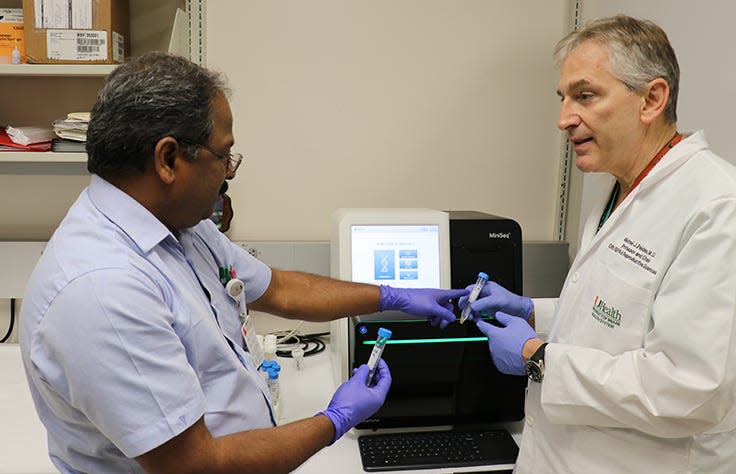Study shows brain damage possible when mothers pass COVID-19 to babies through placenta
- Oops!Something went wrong.Please try again later.
Now that we’re more than three years into the pandemic, COVID-19 is no longer top of mind the way it once was.
Sure, it’s still a serious concern — especially for those with underlying health conditions and/or compromised immune systems.
But it’s far less the daily life-and-death issue it was during the worst periods of 2020-'21.
All that said, COVID-19, regardless of the variant, is still capable of wreaking havoc — as a report released earlier this month by researchers at the University of Miami Health System (UHealth) and the University of Miami Miller School of Medicine showed us.
The report was based on two case studies that showed COVID-19 was transmitted from mothers to newborn babies through the placenta and caused brain damage to the infants.
Arcturus COVID strain invades Florida: And where did the name come from?
COVID in FL: Florida removes more than 32,000 COVID cases from tally without explanation
What'll end antivax belief? A child's death, ex-Palm Beach County top health official says
The study, titled “Maternal SARS-CoV-2, Placental Changes and Brain Injury in Two Neonates,” was published in the journal Pediatrics andis the first study to confirm cross-placental SARS-Cov-2 transmission leading to brain injury in newborns.
While admitted to the Neonatal Intensive Care Unit (NICU) at Holtz Children’s Hospital at University of Miami/Jackson Memorial Medical Center, both infants had tested negative for the virus at birth — but had significantly elevated SARS-CoV-2 antibodies detectable in their blood. This indicated that either antibodies crossed the placenta, or passage of the virus had in fact occurred and that the immune response was that of the infants.
Both infants also experienced seizures, small head sizes and developmental delays. One of the infants died at 13 months of age.
“Many women are affected by COVID-19 during pregnancy, but to see these kinds of problems in their infants at birth was clearly unusual,” said Dr. Shahnaz Duara, professor of pediatrics at the University of Miami Miller School of Medicine, the medical director of the NICU at Holtz Children’s Hospital, and senior author on the study. “We’re trying to understand what made these two pregnancies different, so we can direct research towards protecting vulnerable babies.”

Early in the COVID-19 pandemic, this group of neonatologists had observed transient lung disease and sometimes blood pressure issues among newborns who had similarly tested negative at birth but were born to COVID-19-positive mothers. This was hinted at — but doctors could not confirm whether the problems were caused by inflammatory placental cytokines or whether the SARS-CV-2 virus crossed the placenta and injured the baby.
“If we saw a baby who presented this way, we would call it hypoxic ischemic encephalopathy [brain damage caused by decreased blood flow],” said Dr. Michael Paidas, professor and chairman of the Department of Obstetrics, Gynecology and Reproductive Sciences at the University of Miami Miller School of Medicine and Jackson’s chief of service for obstetrics and gynecology. “But it wasn’t lack of blood flow to the placenta that caused this. As best we can tell, it was the viral infection.”

Hypoxic ischemic encephalopathy in newborns most often occurs during labor and/or delivery, and often the cause is unknown.
Dr. Ali G. Saad, a Miller School professor, neuropathologist, and director of the pediatric and perinatal pathology service at Holtz Children’s, examined both placentas and found pathological changes caused by SARS-CoV-2 in both. He also examined the major changes in the deceased infant’s brain after autopsy and had the following observation: “I was struck by the unexplained severity of the loss of the white matter and the presence of features of hypoxia/ischemia in the cerebral cortex. We became suspicious that the virus, somehow, managed to breach the placental barrier to damage the central nervous system, but this had not been documented before.”

The UHealth report also said that analysis of both placentas clearly demonstrated severe inflammatory changes in each placenta. Also striking, noted the researchers, was the absence of a critical placental hormone called human chorionic gonadotrophin.
This hormone is essential for all fetal development — and is particularly critical for proper brain development.
The UHealth doctors stressed that these cases were exceedingly rare occurrences. In both cases described in the report, the mothers contracted the infection in their second trimester, and subsequently cleared it — but one had a repeat infection in her third trimester. The doctors believe that perhaps an unusual maternal and/or fetal immune response to the virus may have played a role in what happened to the infants.
“We need to continue our research to figure out why these two babies experienced such devastating results,” said Dr. Merline Benny, assistant professor of pediatrics, a neonatologist and author on the report. “Once we fully understand the causes, we can develop the most appropriate interventions.”

Daura, the UHealth pediatrician, had a simple message for would-be mothers: “Use the same precautions you would for your grandparents, for those on steroids or who are immunocompromised.”
She also recommended getting the COVID-19 vaccine before becoming pregnant or early in one’s pregnancy.
“We know about the elderly, what it does to them,” explained Daura. “Babies are also at risk, though we don’t know yet if that risk is across the board, or if there are specific points in gestation that are at risk.”
Daura conceded that she and her colleagues are still learning about COVID-19 — “We’ve only been at it for four years” — but she believes that they know enough to conclude the following: COVID-19 during pregnancy can be problematic.
“It may be a problem for only a handful of people — but it’s a problem,” she said.
This article originally appeared on Palm Beach Post: UM Health shows COVID-19 from mom to baby, possible brain Injury

